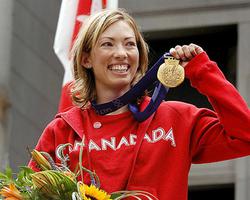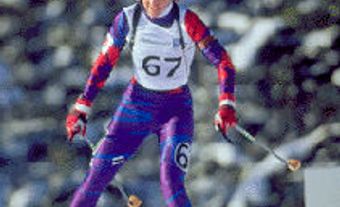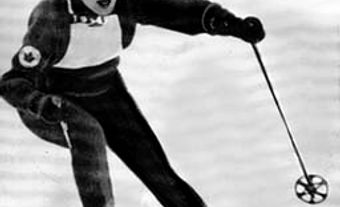Beckie Scott
Beckie Scott, cross-country skier (b at Vegreville, Alberta 1 Aug 1974). An ardent and public advocate for drug-free sport, Scott holds Canada's only medal in cross-country skiing, and is the only Olympian to win gold, silver and bronze medals in the same event. Scott began skiing at age 5 when her parents enrolled her in the local Jackrabbit League in Vermilion. She began racing at age 7. At age 13, under the tutelage of coach Len Parsons, she won her first Junior National competition at 110 Mile House in British Columbia. By age 16, she was a regular competitor at world junior competitions.
In a sport dominated by European athletes, Scott is a lone North American success story in international cross-country ski competition. Her success leading up to the 2002 Salt Lake Olympic Games was gradual. At the 1998 Nagano Olympics, Scott placed 45th in the pursuit event, the controversial race in which she would place 3rd at Salt Lake 4 years later. In 2001, she won Canada's first World Cup medal in 10 years, a bronze in the sprint event. Scott continued to compete among athletes she suspected of using performance enhancing drugs, all the while dedicating her wins to "the clean athletes."
Scott's desire to maintain integrity in sport emerged in several projects during that time. In 2001, alongside her teammates, she helped to circulate an athletes' petition requesting the establishment of an independent drug-testing body for all World Cup and Olympic cross-country skiing competitions. That year, Scott also challenged her fellow athletes at the Continental Cup to donate their prize money to an Afghanistan relief project. She was later recognized by UNICEF for her efforts.
At Salt Lake in 2002, Scott was considered a medal contender in her signature event, the 5 km pursuit, a race that would become a source of controversy later in the Games. Scott initially finished behind Russian teammates Olga Danilova and Larissa Lazutina, who were awarded gold and silver. But when both Danilova and Lazutina tested positive for drugs in other races, the Canadian Olympic Committee (COC) put forth an appeal with the International Olympic Committee, stating that the Russian skiers should also lose their 5-km medals. The COC went further in citing the Olympic Charter that stipulates any athlete caught cheating at the Olympics should be stripped of all medals won at that Olympics, thereby rendering Scott the true Olympic champion. After a lengthy succession of appeals, Scott was awarded the silver medal in June 2003 that had previously been given to Lazutina. In December of that year, she was awarded the gold that had been Danilova's. Uniquely, Scott became the only Olympian to be awarded all three medals in the same event.
Scott's success continued after the 2002 Olympics. Between 2003 and 2005 she added additional World Cup medals in sprint, team and distance events and won 2 world championships. At the 2006 Olympic Games that followed Scott was unable to repeat her individual gold medal performance, securing no higher than a 4th place finish in her events, but she and partner Sara Renner managed a silver medal in the team sprint. Scott retired in 2006 as Canada's most decorated cross-country skier. Soon after, she was chosen to be a member of the board of directors for the Vancouver 2010 Organizing Committee (VANOC).
In addition to increasing the profile of cross-country skiing in Canada, Scott's career has been a public testimony for drug-free sport. As such, she continues to lobby the International Ski Federation (FIS) for stricter regulations and cleaner competitions, and she also serves on the board of the Canadian Centre for Ethics in Sport. In 2005 she was given CBC's Spirit of Sport award at the Canadian Sport Awards.

 Share on Facebook
Share on Facebook Share on X
Share on X Share by Email
Share by Email Share on Google Classroom
Share on Google Classroom




